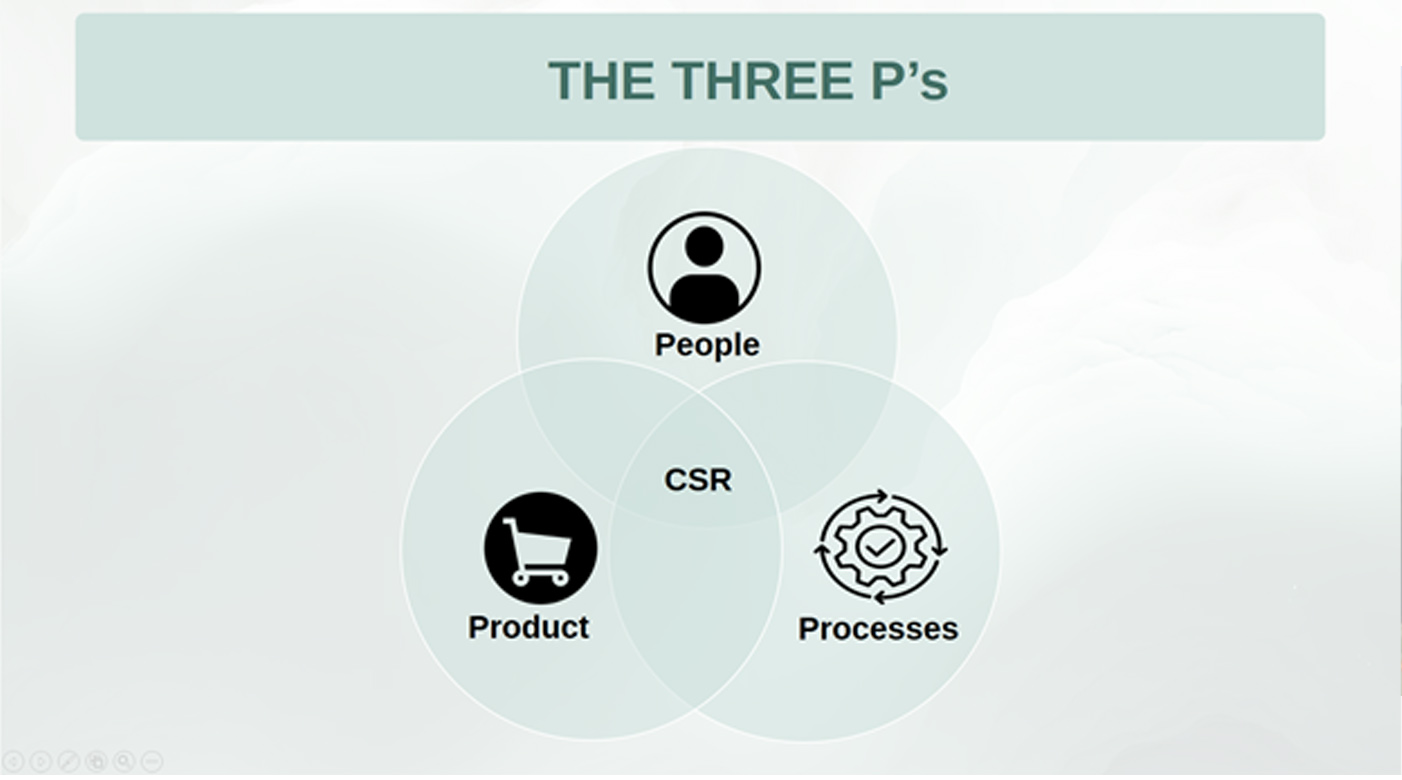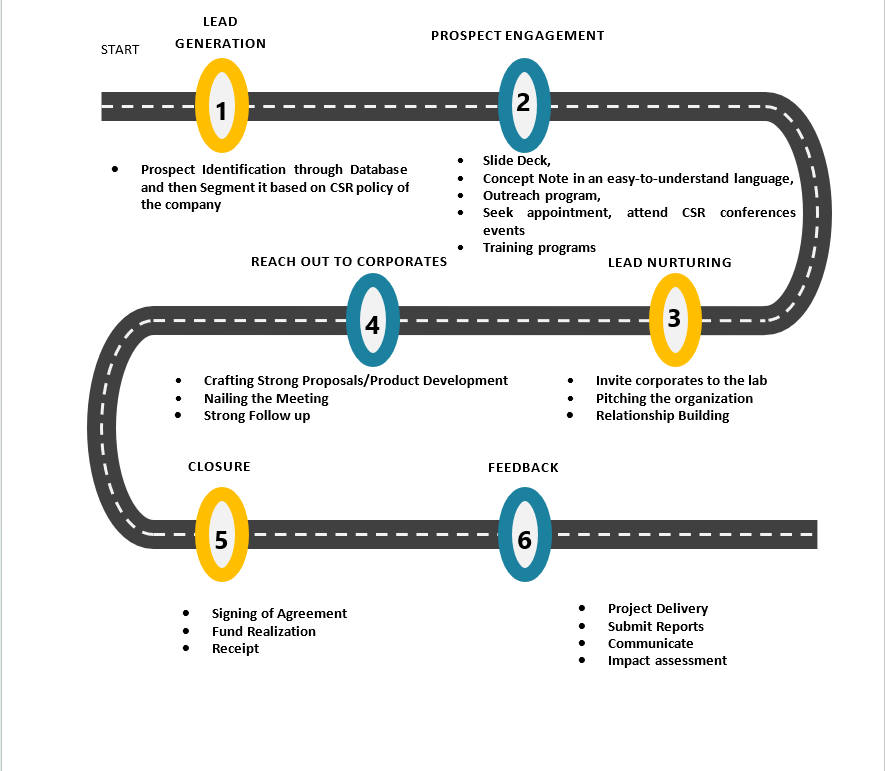Way Forward
As per United Nations Industrial Development Organization (UNIDO), Corporate Social Responsibility is a management concept whereby companies integrate social and environmental concerns in their business operations and interactions with their stakeholders. This means that CSR has moved from a one time engagement move to a strategic CSR which aligns business interests in a corporate’s CSR policy. CSR is not philanthropy. From corporate’s perspective, CSR policy should have an alignment with corporate and business strategies of the firm. CSR is likely to stay aligned to business, and companies will therefore invest in regions and communities with higher economic activity
Way forward is an attempt to suggest a CSR policy framework for Public funded R&D labs in India based on the interaction with CSR experts since April 2024. It’s a suggestive mechanism to guide CSR nodal and labs of giving some of the important dimensions of a CSR fund raising road map. It dwells upon the driving factors for CSR in R&D, some do’s and don’ts and how the CSR landscape shall shape up in the near future.
People, Products & Processes
People
CSR initiatives in the labs would be driven by trained manpower in the CSR domain as people build institutes and then scale up to greater heights. Building internal capabilities would be preferable and sustainable in the long run as scientists and research management professionals know the in and out of their capabilities, limitations, rules and procedures. Hiring external expertise in form of a form or a CSR consultant could be considered as an option in the short run to hand hold the CSR team in their respective labs but eventually, trained expertise in the lab would have to drive CSR initiatives. Laboratories who have been more successful in mobilizing CSR funds have a dedicated and a lean team to look after the CSR affairs and mobilise funds for their respective institutes. The project funded under IRMI has aimed to build this expertise among more than 150 CSR nodal across different laboratories through CSR Knowledge series webinar. These webinars are easily accessible on our website www.csrforresearch.org and anyone who wants to gain insights on the CSR landscape can do so by clicking on these videos. CSR experts are affiliated to academia, industry, ministries, consulting firms, trusts and foundation and together they bring years of their experience in the CSR domain.

Products
Products means impactful solutions that one is trying to offer through research and development proposals. Solutions that have high impact but are low risk in terms of deliverables and milestones. Products need not necessarily be tangible but could align to any of the basis research ideas whose time has come and there exists a gap in the current research. Products help donors assess the value of impact their contribution will create. In context of strategic CSR, assessing impact of the contribution made by the corporate is very important. Products provide direction to the internal teams on tapping fundraising opportunities. Products or solutions offered by a project helps decide on which companies to approach for CSR funds, which SDG’s does a particular project align with and helps assess the overall CSR funding scenario around that particular theme.
Processes
Processes are important in a fundraising program especially when R&D institutes are in the process of learning and navigating the CSR space. Processes will provide the institutional programs the ability to scale which primarily would attract more projects with a bigger ticket size. Processes would help the institutes to sustain the momentum to attract CSR funds and help build strong CSR proposals in strategic alignment with the corporate’s CSR policy. Processes will help build capacity within the system and help the institutes mitigate various risks associated with CSR fundraising programs.
CSR FUNDRAISING ROADMAP
CSR Fundraising process typically starts with identification of the prospect donors who are willing to fund a project under CSR. Annual report of top 50 companies listed under National Stock Exchange (NSE) or Bombay Stock Exchange (BSE) or deep diving into National CSR portal could be a good way to start way and then try and segment that database into PSUs, Listed Companies, MNCs, MSMEs etc. Look for CSR section on a company’s website and identify their priority areas in which a company is willing to fund under CSR. Aligning your project deliverables with a company’s CSR policy may be a right fit and an important criterion for shortlisting the list of companies to whom R&D labs can approach.
Once the set of companies are identified, then try and engage with those companies through an outreach plan. Prepare a well-crafted brief slide deck of the organization that lists the important aspects of the laboratory, its historical setting, its vision and mission, key outcomes in the last decade or so and future vision in terms of making a societal impact. The aim is to make the maximum impact while pitching a proposal to a corporate. This should be followed up by a concept note of the research proposal in a language which is easy to understand and highlight how the proposal resonates with the companies CSR policy.
The actual meeting in an online or offline mode is the cornerstone of any CSR Fundraising roadmap. Crafting strong proposals, laying out the path for product development, detailing the last activity in the value chain, impact that the proposal intends to create are some of the do’s that one should incorporate before the meeting. Attend CSR conferences, events, training programs and CSR conclaves to strengthen relationship building with the donors. Try and have some of these events in your lab to showcase your scientific prowess and capabilities as the proof of the pudding is in the eating. Have a follow up mechanism through regular interaction to have a greater recall value to the previous interaction.
Signing agreements based on the CSR policy of the company and the lab, fund reconciliation, issuing receipts are some of the activities that a lab should adhere to once the proposal is approved at the donor’s end. Deliver on the project as per the agreed milestones, communicate regularly with the donor with project updates, submit reports as required by the funder and intimate for any project delays or unutilized fund well in advance to the donor and reasons for the same may be communicated.
